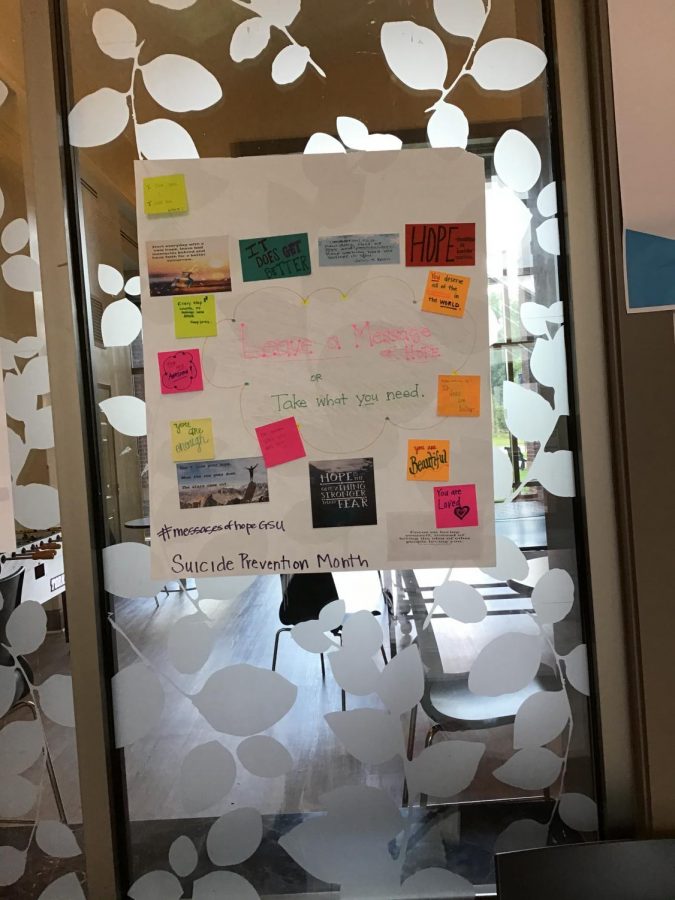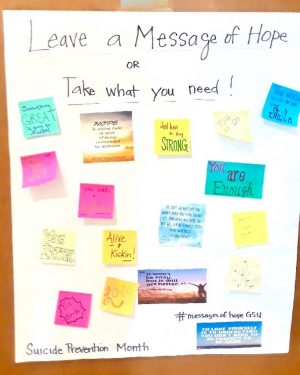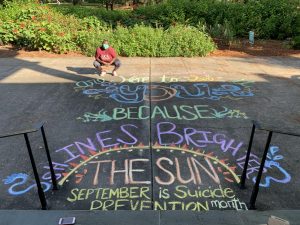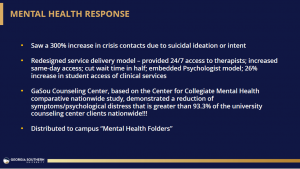Suicidal Thoughts Don’t Discriminate
Highlighting Suicide Prevention for Suicide Awareness Month
September 15, 2020
According to the Centers for Disease Control (CDC), about 47,000 people died of intentional self-harm or suicide in 2017. From those numbers, death by suicide has become the tenth leading cause of death in the country.
Suicide Awareness Month gives everyone an opportunity to open up conversations about the highly stigmatized topic. In bringing awareness, the aim is to give individuals struggling with suicidal thoughts and individuals who know someone struggling the necessary information and resources to help prevent suicide.
The Suicide Prevention Helpline provides a variety of resources for people who have been affected in different ways including people who have survived an attempt or lost a loved one to suicide. They also offer accommodations for mental health help for those with hearing loss, veterans, native Spanish speakers, and more.
Though the Suicide Prevention Hotline is most well-known for its work with suicide prevention, the counselors who work there also provide counseling on other topics as well. Individuals can call the hotline for counseling on topics such as recovering from abuse, sexual identity, economic trouble, loneliness, mental and physical illness and addiction.
If someone is having suicidal thoughts, the Suicide Prevention Lifeline recommends they make a safety plan that includes six steps:
- The person should identify the moods, thought patterns, behaviors, and circumstances that foreshadow a crisis and document them on paper.
- The person should determine strategies that help prevent them from causing harm to themselves.
- The person should find people who can offer support and distraction from the crisis.
- The person should contact friends and family they trust to help them overcome the crisis.
- The person should make a list of the contact information for mental health professionals and agencies as well as make sure the Lifeline number, 1-800-273-8255, is in their phone.
- The person should ensure they are in a safe environment that limits their ability to harm themselves.
According to the National Alliance on Mental Health, if someone is in a crisis, they should take these steps immediately:
- “If you or someone you know is in an emergency, call 911 immediately.
- If you are in crisis or are experiencing difficult or suicidal thoughts, call the National Suicide Hotline at 1-800-273 TALK (8255)
- If you’re uncomfortable talking on the phone, you can also text NAMI to 741-741 to be connected to a free, trained crisis counselor on the Crisis Text Line.”
If an individual knows someone who is struggling with thoughts of suicide, an honest and private conversation is recommended. This conversation should avoid trivializing the struggling individual’s issues or arguing about the value of life.
The National Alliance on Mental Health suggests starting the conversation by mentioning apparent signs, like this: “I’ve noticed lately that you [haven’t been sleeping, aren’t interested in soccer anymore, which you used to love, are posting a lot of sad song lyrics online, etc.] …”
Then, it is recommended that the individual directly asks “Are you thinking about suicide?” as this sends a message to the struggling individual that their loved one is ready for an open-minded non-judgemental conversation about suicide. This lack of judgement is essential to the conversation because the stigma surrounding suicide currently prevents so many people afflicted with these thoughts from opening up and having an honest conversation.
Once that conversation has begun, the National Alliance on Mental Health as well as the American Foundation for Suicide Prevention have some dos and don’ts for individuals initiating the conversation.
If the person is thinking about suicide, they say they have a plan to kill themselves or they have recently thought about suicide, they should always be taken seriously and never be left alone.
Any individual trying to help someone in that situation should call a health care professional or therapist that has been working with the person, remove anything they could use to harm themselves, and call the National Suicide Hotline or 911 as soon as possible.
Then, the individual who is trying to help should be sure to genuinely listen, express concern, and comfort the person with words such as “You are not alone,” “You are important to me,” “We will get through this together” or “I may not be able to understand exactly how you feel, but I care about you and want to help.”
What the person who is trying to help someone who is suspected to be suicidal should not do is try to fix the problem all by themselves, promise secrecy, or ask if someone is having suicidal thoughts in a way that expects “no” for an answer. One should not ask, “You aren’t thinking about suicide, are you?” Phrases such as “We all go through tough times like these. You’ll be fine.” and “It’s all in your head. Just snap out of it.” You’ll be fine.” are also not helpful.
For more extensive information on how to handle a crisis for a loved one, read the National Alliance on Mental Health’s resource guide for those experiencing a mental health emergency, Navigating a Mental Health Crisis.











